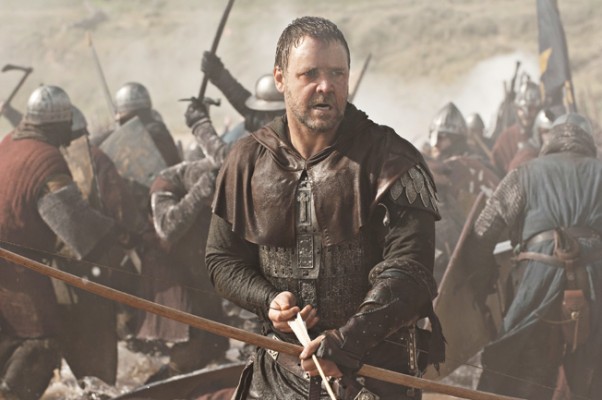The Robin Hood Re-Invention Ends Up Feeling All Too Familiar
Robin Hood
Directed by Ridley Scott
Written by Brian Helgeland from a story by Helgeland, Ethan Reiff, and Cyrus Voris
Universal, 2010
The last time we saw Robin Hood (the Mel Brooks parody aside), we saw Kevin Costner at the height of his star power and Bryan Adams was belting out a ballad about obsessively doing everything for some chick. Robin Hood: Prince of Thieves is pretty much the story we all know: the common man stealing from the rich and giving to the poor and becoming a heroic outlaw. But, because the story of Robin Hood began in the Middle Ages as a bunch of ballads and tales with no true authorship, the story does lend itself to interpretation. Unfortunately here, it’s been interpreted by Ridley Scott.
Scott made a total of 9 films from 1979’s Alien to 1997’s G.I. Jane, but with 2000’s Gladiator he began an unexpectedly prolific career that has seen him make 9 additional films in the last 10 years. 5 of those movies have starred Russell Crowe, and while I might give many of you Gladiator as a “good” movie, the other collaborations: A Good Year, American Gangster, Body of Lies, and now Robin Hood, have all been average at best. And this is what has made Ridley Scott’s name a burden to his movies over the past decade. It seems like he never elevates the material.
Speaking of which, Crowe himself hasn’t really wowed me lately, either. He’s consistently good, but I have to go back to 1999’s The Insider, or maybe even the blah A Beautiful Mind, for a movie that really shows off his talent.
The new Robin Hood has our hero Robin Longstride (Crowe) fighting the good fight for the King, Richard the Lionheart (the ubiquitous Danny Huston). There are a great many people interested in Richard’s possible death, including his brother Prince John (Oscar Isaac) and the King of France. When Richard does indeed get killed in battle, Prince John assumes the throne and sends out his right-hand man Godfrey (Mark Strong) to go around collecting taxes from all the towns around the country. Godfrey has a secret deal with the King of France to run these errands to stir up a civil war around England, so that French troops can swoop in on a divided country and conquer it.
Robin runs into a dying soldier, a Sir Robert Loxley (Douglas Hodge), who wants Robin to go to his home in Nottingham and tell his father Sir Walter (Max von Sydow) the news of his death. When he arrives, the blind Walter gets the notion to consider Robin as his own son, including being married to Marion Loxley (Cate Blanchett), for fear that her land would be taken from her if she stayed unmarried after her father dies. So, in the medieval version of identity theft, Robin Longstride becomes Robert Loxley. It’s here he meets Friar Tuck (Mark Addy), and when King John’s demands go too far, that’s when Robin starts doing the whole steal from the rich and give to the poor thing. But this movie is not interested in that.
Yeah, this movie is more interested in battle. You know, that same old stuff we’ve been seeing forever now. In Braveheart, the sight of hundreds of thousands of extras charging after each other and engaging in bloody battle was an exciting thing. Now, we’ve seen it in three Lord of the Rings movies, two Narnia movies, and probably another ten to twenty other battle epics. When I see a horde of soldiers and battle flags marching in unison I immediately get exhausted. In Braveheart, Mel Gibson did a good job of making us care about it. You know, “Freeeedooooom!” It was a simple thing, with obviously years of anguish behind it. Now, we’re just expected to care. Tyranny is tyranny. Here’s the bad guy, go get him. It’s like battle epics nowadays say, “Remember Braveheart? Well, this guy is just like Edward Longshanks. We don’t need to delve any further. Braveheart did that for us.”
Added to that there is no motivation for the heroes to engage in these battles, either. If there is, it’s kind of vague. William Wallace didn’t want to fight at all…until they killed his woman. It was a last straw that made sense. Now guys (and even gals, this is the 21st Century after all) are getting into wars because…well, it’s just the right thing to do. Or some mystical figure tells you it’s right. These are external factors where people are going to war because it makes other people happy.
Robin Hood is a professionally made movie that isn’t bad, but it commits the sin of being underwhelming. At this point, “average” has become the new “awful.” The indifference to shooting for something better becomes a liability.
Write a comment
You must be logged in to post a comment.
